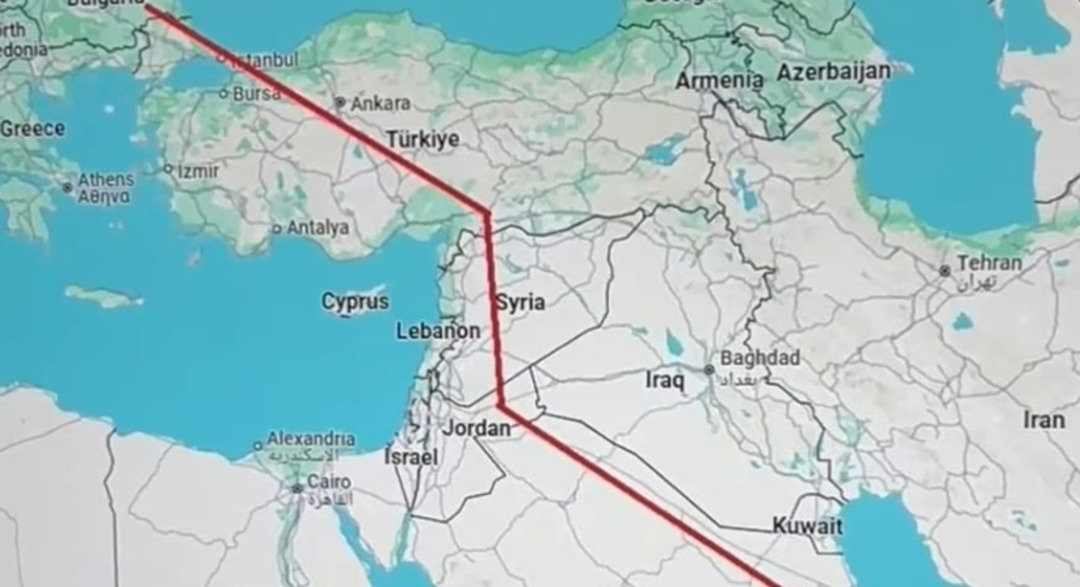-
Debate Over Maritime Border Delimitation and Gas Line in the Eastern Mediterranean

A significant number of Syrians expressed their strong dissatisfaction following reports of the commencement of maritime border delimitation in the Eastern Mediterranean, in addition to discussions about the Arab Gas Pipeline intended to connect Egypt with Jordan, Lebanon, Syria, then Turkey, and ultimately to Europe, under the current caretaker Syrian government.
Syrian journalist Ahmad Al-Rihawi stated in a tweet on X platform: “Mr. Al-Shaibani, we confirm that you have no right to enter into strategic agreements or otherwise. - The Qatari gas line should only pass through official diplomatic channels after the elections. - Maritime border delimitation with Turkey is not within your authority, and you do not have the legal, constitutional, or public legitimacy to undertake such matters. With utmost respect.”
On the other hand, Turkish Minister of Transport and Infrastructure Abdulkadir Uraloğlu stated at the end of December that any agreement regarding this matter would enhance the influence of both countries in exploring energy resources, explaining that any future arrangements would be made in accordance with international laws. The Turkish minister affirmed that Ankara hopes to reach an understanding with the new Syrian administration regarding maritime border delimitation, noting that a potential agreement would allow both countries to expand their oil and gas exploration areas according to international legal frameworks.
It is noteworthy that the idea of creating the Qatari-Turkish gas line, which passes through the aforementioned Arab countries, dates back to 2009 when the project was discussed at a summit in Istanbul between Recep Tayyip Erdoğan, then Prime Minister of Turkey, and the Emir of Qatar, Sheikh Hamad bin Khalifa Al Thani. The goal of the project was to connect the Qatari North Gas Field to Turkey via a line spanning 1,500 kilometers at an estimated cost of around $10 billion.
Observers believe that the project could enhance the energy sector in Syria, which possesses significant potential. This sector could contribute to the efforts of rebuilding the state, particularly if Syria can restore its oil production levels to pre-war figures of around 400,000 barrels per day, with reports indicating that production once reached half a million barrels daily. Annual revenues could reach up to $15 billion at a price of $70 per barrel, resources that may be desperately needed to rebuild its infrastructure devastated by the conflict.
However, activist Mohamed Jamil views the signing of strategic agreements by the interim government as an attempt to solidify its authority, indicating that such decisions fall within the remit of a government elected by the Syrian people, not the responsibilities of a caretaker administration.
You May Also Like
Popular Posts
Caricature
BENEFIT Sponsors BuildHer...
- April 23, 2025
BENEFIT, the Kingdom’s innovator and leading company in Fintech and electronic financial transactions service, has sponsored the BuildHer CityHack 2025 Hackathon, a two-day event spearheaded by the College of Engineering and Technology at the Royal University for Women (RUW).
Aimed at secondary school students, the event brought together a distinguished group of academic professionals and technology experts to mentor and inspire young participants.
More than 100 high school students from across the Kingdom of Bahrain took part in the hackathon, which featured an intensive programme of training workshops and hands-on sessions. These activities were tailored to enhance participants’ critical thinking, collaborative problem-solving, and team-building capabilities, while also encouraging the development of practical and sustainable solutions to contemporary challenges using modern technological tools.
BENEFIT’s Chief Executive Mr. Abdulwahed AlJanahi, commented: “Our support for this educational hackathon reflects our long-term strategic vision to nurture the talents of emerging national youth and empower the next generation of accomplished female leaders in technology. By fostering creativity and innovation, we aim to contribute meaningfully to Bahrain’s comprehensive development goals and align with the aspirations outlined in the Kingdom’s Vision 2030—an ambition in which BENEFIT plays a central role.”
Professor Riyadh Yousif Hamzah, President of the Royal University for Women, commented: “This initiative reflects our commitment to advancing women in STEM fields. We're cultivating a generation of creative, solution-driven female leaders who will drive national development. Our partnership with BENEFIT exemplifies the powerful synergy between academia and private sector in supporting educational innovation.”
Hanan Abdulla Hasan, Senior Manager, PR & Communication at BENEFIT, said: “We are honoured to collaborate with RUW in supporting this remarkable technology-focused event. It highlights our commitment to social responsibility, and our ongoing efforts to enhance the digital and innovation capabilities of young Bahraini women and foster their ability to harness technological tools in the service of a smarter, more sustainable future.”
For his part, Dr. Humam ElAgha, Acting Dean of the College of Engineering and Technology at the University, said: “BuildHer CityHack 2025 embodies our hands-on approach to education. By tackling real-world problems through creative thinking and sustainable solutions, we're preparing women to thrive in the knowledge economy – a cornerstone of the University's vision.”
opinion
Report
ads
Newsletter
Subscribe to our mailing list to get the new updates!






















